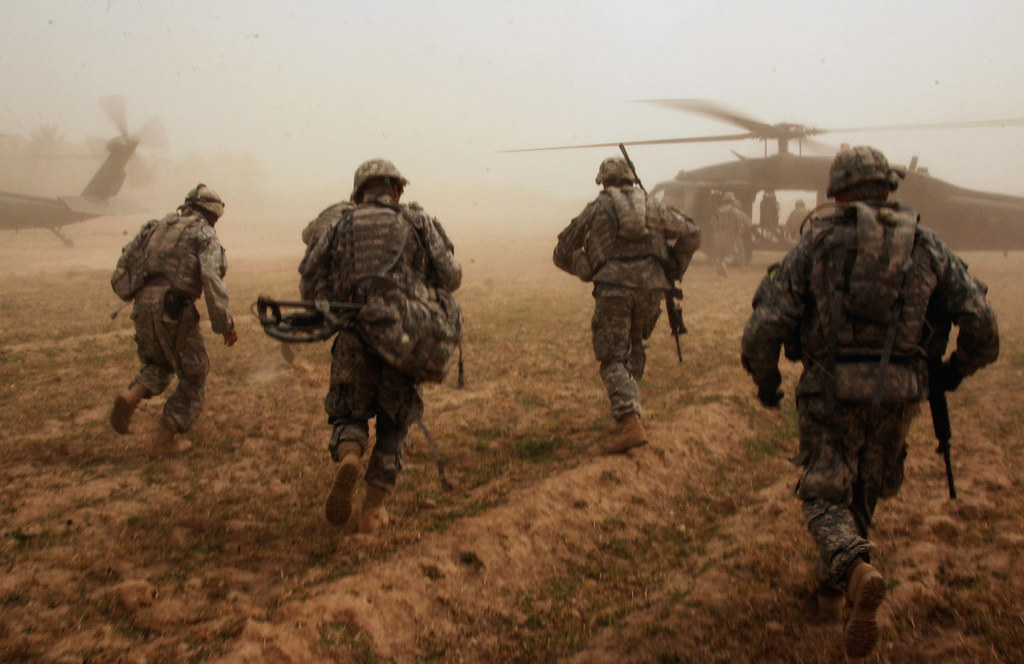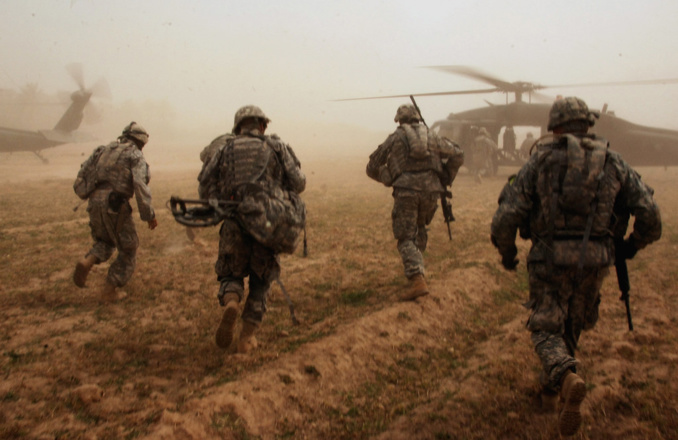On May 15, the US State Department ordered all US non-emergency personnel leave the embassy in Baghdad and the consulate in Erbil (Iraqi Kurdistan). The reason is not indicated, but as early as Sunday, the State Department recommended that the Americans not visit Iraq due to "heightened tension" in the country. The US embassies in Lebanon, Iraq, and the United Arab Emirates also warned American citizens of increasing tensions in the region.
Early last week, representatives of the US Central Command (CENTCOM) reported on Iran’s possible preparation for an attack on US forces in the Middle East.
At the same time, Secretary of State Mike Pompeo canceled his visit to Germany and unexpectedly arrived in Baghdad. According to him, the purpose of the trip was to inform Iraqi officials about the "growing threats" from Iran.
In early May, Assistant to the President of the United States for National Security, John Bolton, announced that he was sending a Navy strike group led by the aircraft carrier Abraham Lincoln to the Gulf region. The American media, citing intelligence information, reported on the threat from Iranian and pro-Iranian forces to the US military in Syria, Iraq, and the Persian Gulf. Besides, the Americans suspected Iran in Sunday sabotage against tankers in the exclusive economic zone of the UAE, which led to a jump in oil prices. This even was followed by an attack of drones on oil pumping stations in Saudi Arabia.
US sanctions on importers of Iranian oil also increase uncertainty in the market. According to Iranian President Hassan Rouhani, the situation in which the Iranians find themselves is even worse than during the Iran-Iraq war of 1980-1988, one of the most difficult periods in the country's history. “During the war, we had no problems with our banks, oil sales, imports and exports,” he said. And supreme leader Ali Khamenei calls for a tough "resistance" policy, which is based on finding ways to circumvent sanctions, strengthen the armed forces and promote Iranian interests in the region.
On May 15, the International Energy Agency predicted a drop in Iranian oil production due to US sanctions to record lows in the period after the Iran-Iraq war.
Technically, this is true right now. According to OPEC, in April, production in Iran fell to 2.55 million barrels per day (bpd), which is the lowest level in annual terms since 1989. The IEA estimates Iran's oil exports in April at 1.3 million bps, that is, half as much as a year ago. In 2014, when the oil embargo against Iran was supported not only by the US, but also by the EU countries, Iranian oil production was significantly higher than it is now - about 3.1 million bpd.
However, production and export data are collected from secondary sources, and Iran itself stopped to provide OPEC with information on production since the fourth quarter of 2018, when US sanctions entered into force. Given that one of the main ways that Iran uses to circumvent sanctions is to misrepresent its oil for oil from another Gulf country (usually Iraq, in the ports of which fabricated cargo documents are issued), secondary data may be understated. So, in April, Iran's production fell by 164 thousand bpd, and Iraq increased production by 113 thousand bpd.
Not being able to increase the volume of oil supplies, Tehran is most interested in rising prices. Rising oil prices by $ 1 per barrel theoretically increases Iran’s revenues by $ 1.3 million per day. For example, as a result of sabotage against several tankers of Saudi Arabia in the waters of the UAE on May 13, prices rose by about $ 2 per barrel, to $ 72.5, but then dropped to $ 70.5, despite an attack on oil pipeline facilities in Saudi Arabia.
Everyone is afraid of the military scenario. “Accident can lead to conflict, although neither side wants to,” said British Foreign Secretary Jeremy Hunt earlier this week. The same opinion is shared by Austrian President Alexander Van der Bellen. “If the Americans increase the pressure on Iran, then there is a big threat that a new crisis will arise there, as in Iraq. Nobody wants this in the European Union,” he said on May 15 following talks with Russian President Vladimir Putin in Sochi. The Austrian President also called the new US sanctions against Iran "provocative".
source: reuters.com, bloomberg.com, cnn.com
Early last week, representatives of the US Central Command (CENTCOM) reported on Iran’s possible preparation for an attack on US forces in the Middle East.
At the same time, Secretary of State Mike Pompeo canceled his visit to Germany and unexpectedly arrived in Baghdad. According to him, the purpose of the trip was to inform Iraqi officials about the "growing threats" from Iran.
In early May, Assistant to the President of the United States for National Security, John Bolton, announced that he was sending a Navy strike group led by the aircraft carrier Abraham Lincoln to the Gulf region. The American media, citing intelligence information, reported on the threat from Iranian and pro-Iranian forces to the US military in Syria, Iraq, and the Persian Gulf. Besides, the Americans suspected Iran in Sunday sabotage against tankers in the exclusive economic zone of the UAE, which led to a jump in oil prices. This even was followed by an attack of drones on oil pumping stations in Saudi Arabia.
US sanctions on importers of Iranian oil also increase uncertainty in the market. According to Iranian President Hassan Rouhani, the situation in which the Iranians find themselves is even worse than during the Iran-Iraq war of 1980-1988, one of the most difficult periods in the country's history. “During the war, we had no problems with our banks, oil sales, imports and exports,” he said. And supreme leader Ali Khamenei calls for a tough "resistance" policy, which is based on finding ways to circumvent sanctions, strengthen the armed forces and promote Iranian interests in the region.
On May 15, the International Energy Agency predicted a drop in Iranian oil production due to US sanctions to record lows in the period after the Iran-Iraq war.
Technically, this is true right now. According to OPEC, in April, production in Iran fell to 2.55 million barrels per day (bpd), which is the lowest level in annual terms since 1989. The IEA estimates Iran's oil exports in April at 1.3 million bps, that is, half as much as a year ago. In 2014, when the oil embargo against Iran was supported not only by the US, but also by the EU countries, Iranian oil production was significantly higher than it is now - about 3.1 million bpd.
However, production and export data are collected from secondary sources, and Iran itself stopped to provide OPEC with information on production since the fourth quarter of 2018, when US sanctions entered into force. Given that one of the main ways that Iran uses to circumvent sanctions is to misrepresent its oil for oil from another Gulf country (usually Iraq, in the ports of which fabricated cargo documents are issued), secondary data may be understated. So, in April, Iran's production fell by 164 thousand bpd, and Iraq increased production by 113 thousand bpd.
Not being able to increase the volume of oil supplies, Tehran is most interested in rising prices. Rising oil prices by $ 1 per barrel theoretically increases Iran’s revenues by $ 1.3 million per day. For example, as a result of sabotage against several tankers of Saudi Arabia in the waters of the UAE on May 13, prices rose by about $ 2 per barrel, to $ 72.5, but then dropped to $ 70.5, despite an attack on oil pipeline facilities in Saudi Arabia.
Everyone is afraid of the military scenario. “Accident can lead to conflict, although neither side wants to,” said British Foreign Secretary Jeremy Hunt earlier this week. The same opinion is shared by Austrian President Alexander Van der Bellen. “If the Americans increase the pressure on Iran, then there is a big threat that a new crisis will arise there, as in Iraq. Nobody wants this in the European Union,” he said on May 15 following talks with Russian President Vladimir Putin in Sochi. The Austrian President also called the new US sanctions against Iran "provocative".
source: reuters.com, bloomberg.com, cnn.com



















